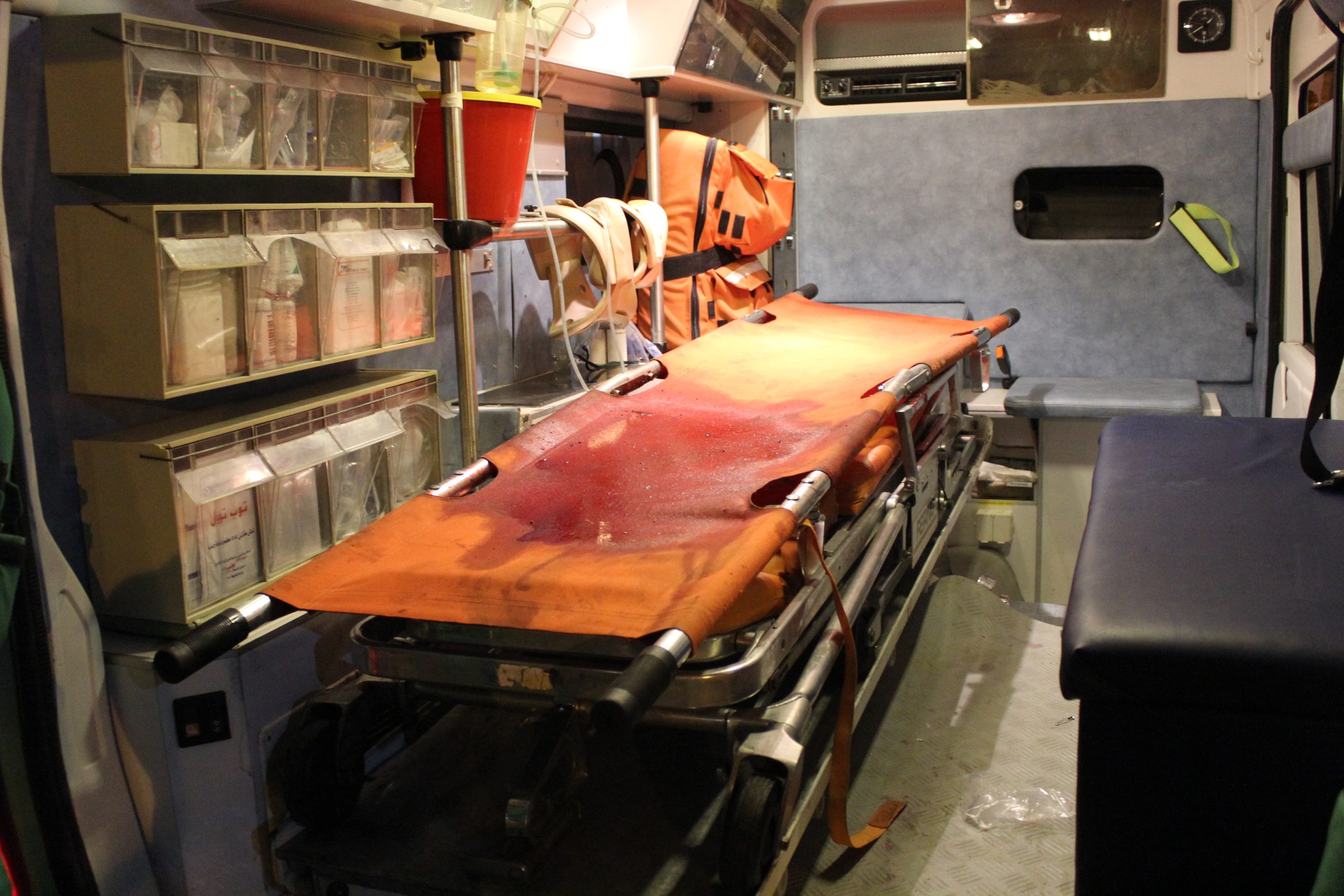
An ambulance at Shifaa Hospital, Gaza, November 2023. Gigi Ibrahim via Flickr. CC BY 2.0 DEED
Why the focus on health system resilience? Isn’t it the shocks we should be addressing?
7 December 2023
Dr Karin Diaconu of Queen Margaret University reflects on the study of health systems resilience and questions its purpose when the health system itself and the population it serves are under existential threat.
NB All links open new tabs.
International Migrants Day (18th December) is a day set aside to recognise the important contribution of migrants while highlighting the challenges they face. The purpose of this day – among a calendar of similar Global Days – is to keep the spotlight on migrants, support fundraising and advocacy efforts, and to influence global, national and local policy.
On this Migrants Day I am reflecting on one of the longest histories of displacement in modern history – that of the Palestinian people. There are many who have summarised the tragedy of this displacement better than I could (Said 1992, Khalidi 2020), and many who are highlighting the continued tragedies and injustices faced by Palestinians today. The latter include journalists (e.g. M Azaiza) and entertainers (e.g. B Youssef), doctors (e.g. G Abu-Sittah), academics (e.g. AW Hammoudeh, Rita Giacaman and H Kienzler to name just a few) and human rights lawyers (e.g. C Mokhiber).
This is not a blog post that looks to rehash current events or indeed to celebrate the individual or collective resilience of Palestinians – because the expectation of resilience in the face of occupation and displacement should never be anyone’s priority (Shwaikh 2023). This blog reflects on the resilience of health systems, and asks whether this is a topic worthy of continued study given ongoing systemic violence in Gaza and particularly given the repeated weaponisation of health care and aid (Fouad et. al. 2017 and Jamal 2023). I reflect on what it means to study the resilience of health systems to shocks or stressors, when these are purposefully designed to disrupt and irreparably damage them.
Why focus on this topic?
Much of our work in ReBUILD for Resilience is guided by a theoretical framing of health systems resilience that directly draws on the experience of the United Nation Refugee and Works’ Agency (UNRWA) for Palestine Refugees in the Near East.
Between 2016–19, colleagues and I studied how UNRWA coped with the forced displacement of Palestine refugees from Syria, either internally or into neighbouring Jordan and Lebanon (there’s more on that study here). What we learned there set the bar for what we would expect to see or study elsewhere. This is not because UNRWA or its responses were perfect (though they were effective) (Alameddine et. al. 2018), but rather because what we saw was a system so steadfast in its commitment to serving and learning that we felt this was a starting point for unpacking resilience at systemic levels, also in other contexts.
Our work with UNRWA highlighted how systems display different ways of responding to shocks, either by absorbing additional demands, adapting in the face of them, or completely transforming to meet them (Alameddine et. al. 2018, Jamal et. al. 2019, Blanchet, Witter and Diaconu 2020). Key throughout this was the unwavering commitment of all UNRWA workers to their mission: supporting Palestinians in small and big ways to maintain their dignity and health.
Health systems do not exist in vacuums, though. Even during our study back then, we saw how political and economic agendas shaped what UNRWA could do. Towards the end of our project no one was discussing the Syrian war, or the repeated displacement of the Palestine refugees from Syria. Instead, all eyes were on the USA and its withdrawal of funding from UNRWA (Beaumont and Holmes in The Guardian). Less funding equals less care delivered and fewer lives saved. Even our very rudimentary and conservative models at the time estimated that the funding reduction would result in a minimum of 20% decline in service coverage. In the first year alone, this would mean more than 250 maternal deaths and over 2000 neonatal deaths (Ager et al 2018).
As a global health and health systems researcher, I grappled with the question: why keep studying resilience? Why focus on systems being resilient to shocks, when it is the shocks themselves that we should tackle? I think core to both my practice and that of many colleagues is the idea that as academics we generate knowledge and evidence that we hope one day will be used to change the status quo. However, the shocks are escalating, and the status quo is changing more rapidly than we may have ever expected, albeit towards the negative (Reidpath et. al. 2023).
How do we respond to such changes while also addressing the glaring dark corners of a field like global health, where the production of knowledge and evidence is rooted in the systems which perpetuate inequality and inequity (Abimbola 2021, Atuire and Bull 2022, Burgess 2023)? Perhaps that should be the next major research – or emancipation – topic for us all.
Image: An ambulance at Shifaa Hospital, Gaza, November 2023. Gigi Ibrahim via Flickr. [Opens new tab] CC BY 2.0 DEED